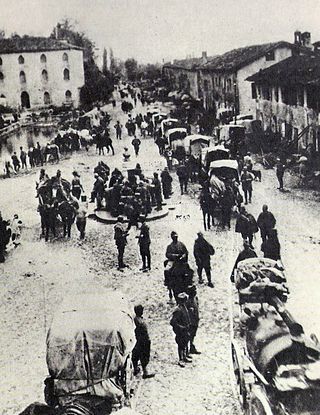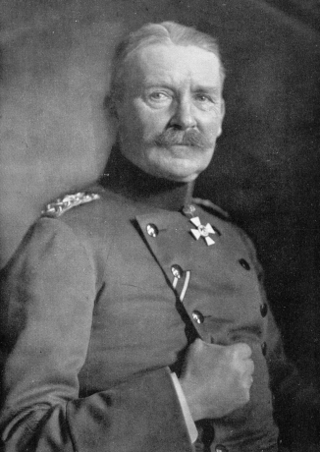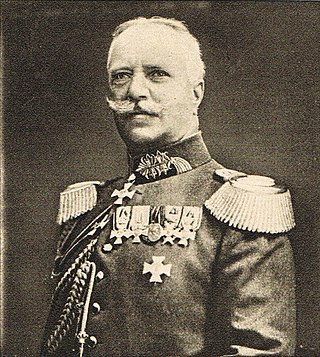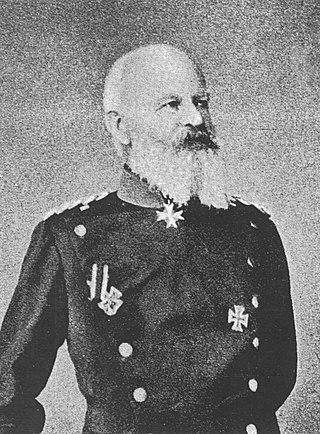This is an order of battle of the French and German Armies at the beginning of the Franco-Prussian War in 1870.
This is the German Army order of battle on the outbreak of World War I in August 1914.
The Royal Bavarian Life Guards was a household, life guard (bodyguard) regiment of the Bavarian kings from the end of the Napoleonic Wars until the fall of the Wittelsbach monarchy and the subsequent disbanding of the Bavarian army.

Gustav Adolf von Wulffen was a German highly decorated officer in the Wehrmacht with the rank of Generalmajor and SS-Officer with the rank of SS-Brigadeführer. He was decorated with the highest prussian decoration for bravery, Pour le Mérite on April 21, 1918, as Battalion Commander.

The Battle of Caporetto, took place from 24 October to 19 November 1917, near the town of Kobarid, on the Austro-Italian front of World War I. The battle was named after the Italian name of the town of Kobarid.

Karl Ludwig d'Elsa was a Royal Saxon army officer who was a Generaloberst in the First World War and awarded the Pour le Mérite.

Adolf Wilhelm Bernhard von Brauchitsch was a German army officer with the rank of major general. A very experienced officer, he worked with the Army High Command under Hans von Seeckt and in the Ministry of the Reichswehr, before retiring in 1929 due to failing health.

Alexander Ferdinand Ludolf von Quast was a Prussian military officer, participant in the Franco-Prussian War and a general in the First World War. He commanded the German 6th Army during the Battle of the Lys of the Spring Offensive in 1918.

Karl Christof Friedrich von Gerok was an officer of Württemberg, general of the infantry of the XXIV Reserve Corps during World War I.

Max Ferdinand Karl von Boehn was a German officer involved in the Franco-Prussian War and World War I. He held the rank of Generaloberst in World War I.

Bernhard Gottfried Max Hugo Eberhard, Graf von Schmettow, usually shortened to Eberhard Graf von Schmettow, was a German general of World War I.

Walter Petzel (1883–1965) was a German officer, who finished as a General of Artillery in the Second World War.

Born into an aristocratic Prussian family, Albert Gustav Guido von Rauch was a general of the infantry in the Prussian Army who fought in the Austro-Prussian War and Franco-Prussian War.

Eduard Georg Gustav von Below was a German General of the Infantry who notably served in World War I.

Johannes von Busse was a German lieutenant general who was most notable for his service in the Romanian Campaign of World War I.

Richard Heinrich Karl von Conta was a German General der Infanterie during World War I. He was notable for his participation in the Battle of Belleau Wood.

Franz Martin Chales de Beaulieu was a German general in World War I. He was also involved in the Herero Wars as chief of staff to Lothar von Trotha.

Theodor Alexander Viktor Ernst von Schoeler was a Prussian General of the Infantry who served in the Austro-Prussian War and the Franco-Prussian War through several battles.

Arnold Lequis was a German General of the Infantry who commanded the 12th Division during World War I as well as a commander of the Reichswehr during the German Revolution of 1918–19 against the Communists.

Georg Karl Kuno Alfred von Larisch (1856-1952) was a German General of the Infantry during World War I. He commanded the 10th Division, the 81st Reserve Division, the Guard Ersatz Division, and the Generalkommando z.b.V. 54 on the Western and Eastern fronts.

















